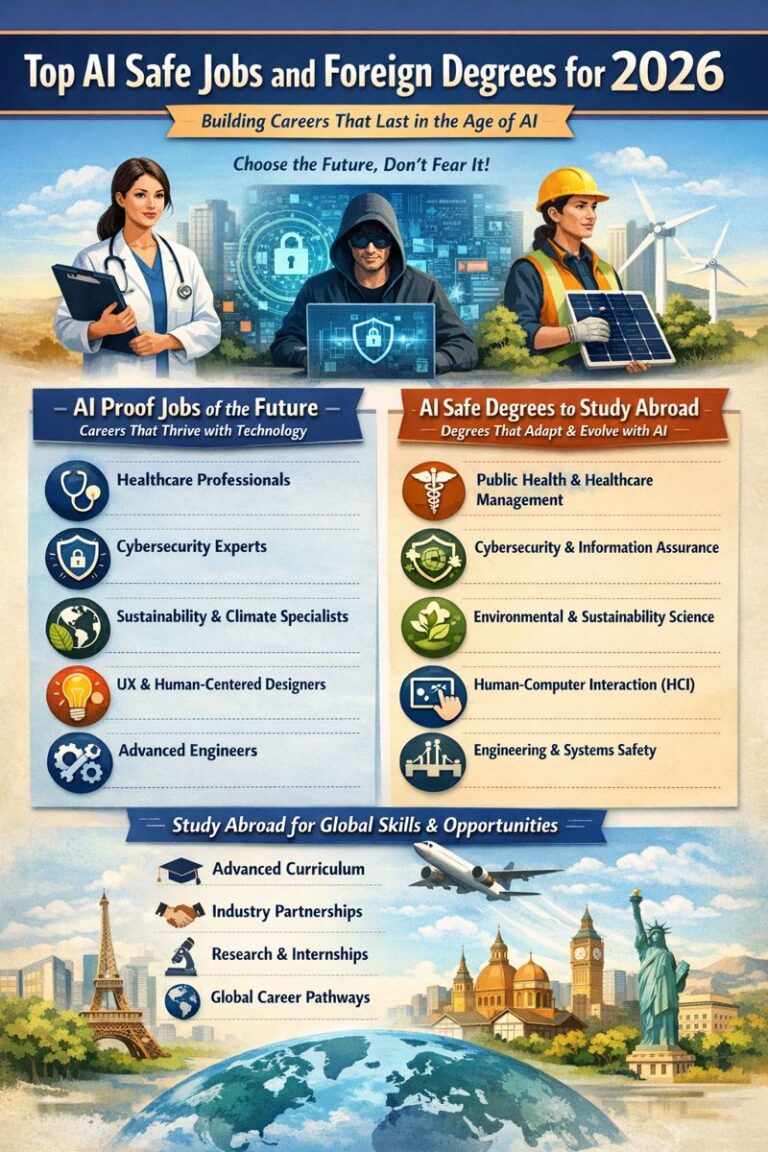European boardrooms are paying a premium for leaders who can steer strategy across 27 markets and 24 languages. And getting an executive MBA in Europe has become a fast track to the C-suite.
The Financial Times 2024 EMBA list reported that graduates make an average salary of US$ $292,873 three years after finishing. That’s around ₹2.45 crore, and 60 % more than before the programme.
That upside comes at a serious price, though. European EMBAs can be costly, especially at prestigious institutions. For instance, London Business School now charges £129,950 for its Executive MBA, while INSEAD’s GEMBA Europe stream costs €142,000.
Yet, thousands of Indian managers still apply every year. The appeal is evident. Europe offers shorter study blocks, post-study work visas, and proximity to the innovation hubs.
When done right, the investment pays back long before your loan EMIs end. Let’s find out why it makes sense for Indian professionals to pursue an executive MBA from a European university.
What is an executive MBA?
An Executive MBA (EMBA) is a part-time master’s degree built for senior professionals. Classes take place on long weekends or in one-week modules. This lets you study without quitting your job.
Students in an EMBA program usually have many years of work behind them. For example, INSEAD’s GEMBA Europe class has, on average, 14 years of work experience. This means most classmates have spent over a decade in their careers before joining.
Because your peers are seasoned professionals, you will have a greater opportunity of learning from their real-world insights. You can also build a strong network of senior leaders.
Here’s how an EMBA differs from a full-time MBA:
- Schedule – modular or blended, not daily lectures.
- Peer group – directors and VPs, not early-career analysts.
- Curriculum – heavier on corporate strategy, leadership, and digital transformation.
- Immediate ROI – lessons are applied at work the next Monday.
Formats vary across EMBA Europe programs. London Business School alternates four-day blocks in London and Dubai. IESE offers Friday–Saturday sessions plus two global immersion weeks. Such flexibility lets Indian executives limit unpaid leave while gaining a multicultural network.
Cost of an executive MBA in Europe
Tuition cost for an executive MBA in Europe can be around €58,000 to €150,000. The range reflects brand strength, campus locations, and the number of international residencies.
Understanding the spread helps identify truly affordable Executive MBA programs in Europe. Let’s take a look at what the top European universities charge for their EMBA programs:
| Country | Flagship EMBA Schools | Tuition Range (local) |
| United Kingdom | London Business School, Oxford Saïd | £124,920 to £129,950 |
| France | INSEAD
HEC Paris |
€115,000 to €142,000 |
| Spain | IESE
IE Business School |
€83,000 to €102,000 |
| Switzerland | IMD | CHF 125,000 |
| Germany | ESMT Berlin | €64,800 |
| Netherlands | Rotterdam School of Management | €65,000 |
| Italy | SDA Bocconi (Modular) | €58,000 |
Note: The rates mentioned here are just the sticker prices. The overall cost would be much higher as it would also include the following items:
- Travel and lodging: Multi-campus modules can add € 10,000 to € 15,000.
- Opportunity cost: average European EMBA requires about 50 working days; factor in lost bonuses.
- Living expenses: INSEAD estimates €20k for the 14-month period.
For most Indians, the total cost of an executive MBA in Europe makes it simply out of reach. Thankfully, there are several ways to pay for an EMBA in Europe that don’t involve emptying your savings account. Here are a few you can consider:
- Company sponsorship: Many companies sponsor EMBAs for employees in leadership positions. You may be able to negotiate partial funding tied to retention clauses.
- Education loans: Both government banks and NBFCs offer loans for EMBAs. GradRight’s loan search platform makes the process of getting student loans even simpler.
- Scholarships and funding: Many universities also offer scholarships and financial aid to academically gifted students.
Consider the total average cost of an executive MBA in Europe when creating your budget. This way, it will become a planned investment, not a surprise invoice.
Eligibility criteria for an executive MBA in Europe
The average EMBA participant is 39 years old with 15 years of work experience and nine years in management. Entry rules vary by school, but the fundamentals rarely change. Here are the core eligibility requirements for an executive MBA in Europe:
- Professional experience: Most programmes demand 8-15 years. INSEAD’s Europe stream averages 14 years. HEC Paris sets a minimum of eight.
- Academic record: A recognised bachelor’s or equivalent. Some schools accept exceptional diploma-holders with long managerial track records.
- Aptitude test: GMAT, GRE, or the Executive Assessment (EA). The EA is a 90-minute exam with three 30-minute sections that test integrated, verbal, and quantitative reasoning.
- English proficiency: IELTS 6.5-7.0 or TOEFL iBT > 95 unless your degree was fully in English.
- Time commitment: Expect 51-60 working days away for modular formats like INSEAD GEMBA.
Build a clear ROI case in your essays. European panels weigh promotion potential as much as grades.
Top universities for an executive MBA in Europe
Europe hosts nine of the Financial Times’ global top-20 EMBA programmes.
Each school below combines triple accreditation, strong salary lifts, and global cohorts. Yet, their structures and fee levels differ sharply. Compare them before you commit.
| School & Programme | Country | Duration / Format | Tuition fee | Key Highlights |
| INSEAD GEMBA (Europe stream) | France | 14–17 months
5 one-week modules |
€142,000 | 51 to 60 days off work
leadership labs |
| London Business School EMBA | UK | 20 months
4-day blocks |
€152,000 | London–Dubai track
69 % salary jump |
| HEC Paris EMBA | France | 15-18 months
modular |
€115,000 | ESG and luxury electives |
| IESE Global EMBA | Spain | 18 months
blended and 3 global weeks |
€83,000 | Case-method rigor
US & Asia modules |
| IMD EMBA | Switzerland | 15–19 months
intensive modules |
€129,000 | Leadership stream & “Discovery” expeditions |
| Oxford Saïd EMBA | UK | 22 months
1-week blocks |
€146,000 | Oxford college life
72-country cohort |
| Esade EMBA | Spain | 18 months
monthly hybrid |
€71,600 | Monthly schedule
entrepreneurship labs |
| ESMT Berlin EMBA | Germany | 18 months
modular |
€64,800 | Digital-innovation focus
90% international trip rate |
Wondering how you should choose the best executive MBA programs in Europe? Prioritise FT or QS ranking, fee-to-salary ratio, visa length, and how often you must fly to campus.
Check that the degree holds triple accreditation (EQUIS, AACSB, AMBA) and that the schedule fits your notice-period limits.
Salary after completing an executive MBA in Europe
Three years after graduation, European EMBA alumni routinely cross the US$300,000 mark.
London Business School reports US$314,034 with a 69% jump over pre-programme pay. INSEAD GEMBA alumni reach US$346,472, with a 57% jump. IESE’s Global EMBA sits at US$328,158 with a 59% salary jump.
When averaged, that is US$329,000, far above many Director-level packages in India.
Full-time MBA graduates from the same schools start lower. INSEAD MBA salary today is US$198,904, while LBS MBA is US$192,331.
The gap illustrates the premium for senior experience, validating the executive MBA vs MBA salary Europe debate.
You may even notice a significant salary difference depending on the sector. Consulting and finance still top the chart, sometimes exceeding €350,000. Tech leadership roles sit closer to €250,000.
Entrepreneurship is rising. Studies show that 33% of EMBA alumni over 45 start ventures within three years.
Career opportunities post-EMBA
Want to get a job and settle down in Europe after completing the EMBA? You’re in luck.
European organizations are constantly looking for competent leaders who can manage cross-border teams, digital transformation, and climate-driven supply-chain shifts.
Employers actively court executives who leave an executive MBA in Europe with fresh strategy tools and a network that spans every major market.
Indian managers also gain mobility through Schengen travel, EU Blue Card pathways, and access to global boards. That makes the degree an accelerator rather than a sabbatical.
Promotion Paths During the Program:
Many participants begin reaping returns before graduation:
- Scope expansion: added P&L responsibility or a regional mandate.
- Title bumps: Senior Manager to Director to VP.
- Project leadership: heading a transformation office or M&A work-stream.
These early wins build an internal ROI case that often unlocks company sponsorship for remaining fees.
Post-EMBA Career Tracks:
After completing an EMBA, graduates can follow different career paths. Some rise quickly within their current company.
Others switch industries or launch new ventures. Each track uses both prior expertise and fresh leadership skills.
- In-company acceleration:
- Chief Operating Officer, Country Head, or Global Function Lead within 12-24 months.
- 10–20 % equity grants at privately held firms.
- Strategic pivot:
- Moving from IT services to fintech products, or from engineering to sustainability consulting.
- Recruiters value the mix of deep domain expertise plus newfound general-management skills.
- Entrepreneurship:
- 33 % of European EMBAs launch or acquire a business within three years.
- Courses on venture financing, plus alumni angel networks, de-risk the leap.
Want to maximize your outcome? Lock a three-year career vision before enrolling. You may also involve your mentor or HR partner early. Make sure to budget time for job-market exploration weeks that many programmes include.
Conclusion
The numbers are clear. Tuition can top €150,000, yet median pay rises to about €300,000 within three years. Then, there are stock, networks, and international mobility.
An Executive MBA in Europe is therefore less a cost and more a leveraged investment. Make sure to choose a curriculum that aligns with your growth lane.
Negotiate employer backing and commit fully to applying new tools at work from day one.
Frequently asked questions
1. What is the cost of an Executive MBA in Europe?
Cost ranges from €58,000 at SDA Bocconi to about €152,000 at London Business School. Budget another €10,000 to €20,000 for travel, visas, and accommodation, plus opportunity cost of around 50 workdays. Scholarships, GradRight loans, and employer sponsorships reduce the out-of-pocket burden significantly.
2. What are the eligibility requirements for an EMBA program in Europe?
The standard executive MBA eligibility criteria in Europe include a recognised bachelor’s degree, 8 to 15 years of professional experience with managerial accountability, fluent English demonstrated by IELTS 6.5+ or TOEFL 95+, and a qualifying test—GMAT, GRE, or the Executive Assessment. Most schools also require employer endorsement letters confirming time off and financial support.
3. How long does it take to complete an Executive MBA in Europe?
Most EMBA programs in Europe are modular. That lets students work while they study. A typical executive MBA in Europe takes 15 to 22 months. It’s delivered through monthly long-weekend blocks or one-week intensives combined with three to five global residencies. Expect about 500 contact hours plus pre-class preparation and remote teamwork time.
4. What is the average salary for Executive MBA graduates in Europe?
Financial Times data show executive MBA salary after graduation in Europe average US$300,000 (~€275,000) three years out. That represents a 55% to 70% growth over pre-program pay. Median packages at London Business School, INSEAD, and IESE hover around €290,000 base. In addition to base pay, there are bonuses, stock, and profit-sharing in certain leadership roles.
5. Which are the top universities in Europe for an Executive MBA?
Top Executive MBA universities in Europe include INSEAD, London Business School, HEC Paris, IESE, IE Business School, IMD, Oxford Saïd, Esade, and ESMT Berlin.


















